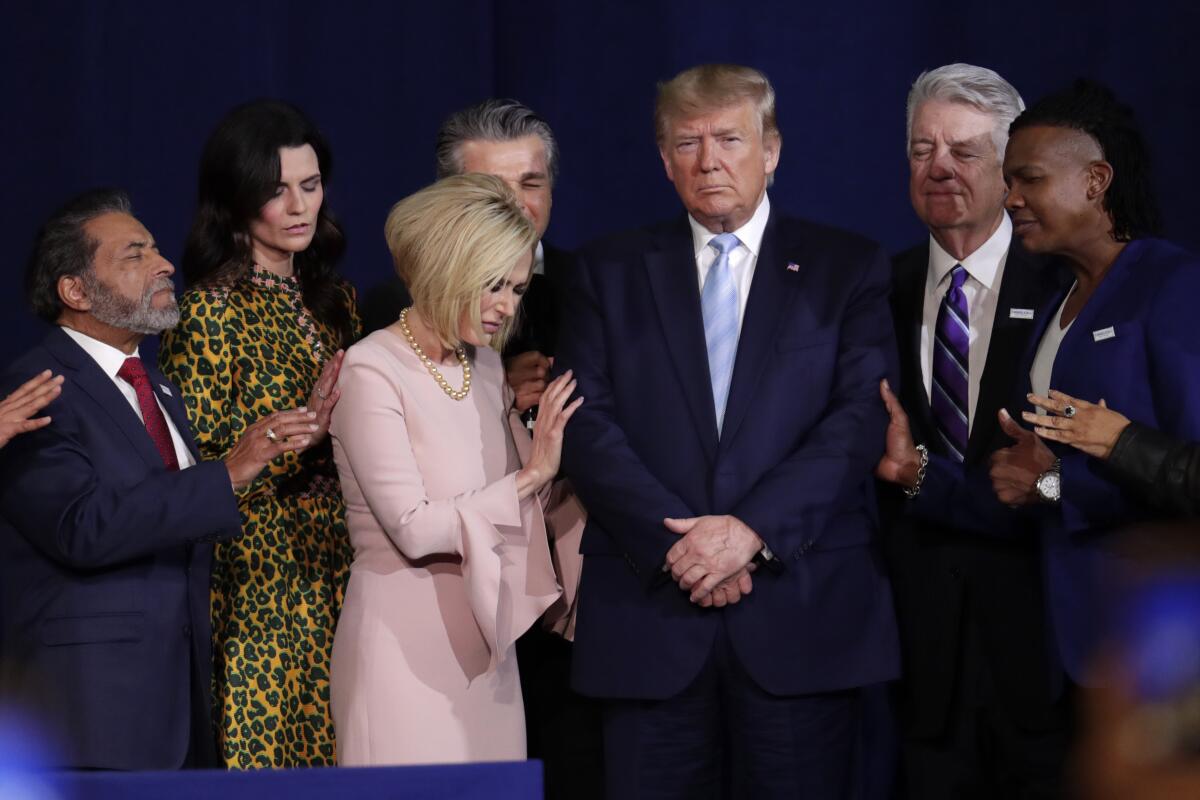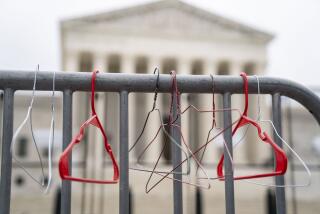Could Supreme Court rebukes of Trump policy cost him critical support from white evangelical voters?

White evangelical voters have been the staunchest supporters of President Trump, putting aside misgivings over his crass statements and messy personal life because of his promise to stack the judiciary with conservative judges sympathetic to their views on issues such as religious liberty and abortion.
He successfully nominated two Supreme Court justices, giving the body a majority chosen by Republican presidents. But recent rulings by the high court, notably a 6-3 decision expanding gay and transgender rights that was written by Justice Neil Gorsuch, Trump’s first addition to the bench, have drawn widespread criticism from evangelical voters and caused some to question the compromises they made in casting their last presidential ballot.
“This has definitely introduced doubt,” said the Rev. Rob Schenck, a prominent former evangelical activist. “It kind of takes away the one thing that gives him an edge with that type of evangelical voter — a skeptical evangelical voter, a less certain one.”
There are more than four months to go until the general election, and other significant decisions on issues such as abortion and religious discrimination are expected in coming days. But questions are bubbling over whether that disenchantment undermines support for the president among his most steadfast backers.
Some say, however, that the ruling on LGBTQ rights and a second decision that left intact California’s “sanctuary” law giving protections to those in the country illegally will prompt socially conservative voters to double down on Trump.
“While there might be some disappointment in a political sense, in the end, Christians are people of principles,” said Costi Hinn, a conservative evangelical pastor and author in Arizona. “I’m hearing 100% get the president back into office so that the job can be finished and pushed further.”
Trump almost certainly needs a strong turnout of white conservative evangelical voters to win a second term in November. The group makes up about one-fifth of registered voters, and exit polls in 2016 found that 81% voted for Trump.
Trump spent months on the campaign trail warning that if Hillary Clinton were elected president, her appointments to the Supreme Court would tilt the country to the left for a generation.
“It’s our last chance,” he told supporters in 2016 at a steamy summer rally in Phoenix. “And that includes Supreme Court justices…. Remember that.”
Trump has successfully nominated Gorsuch and Brett Kavanaugh to the high court, creating a 5-4 majority of justices nominated by Republicans.
Since then, while Trump has seen notable drops in support among many voter groups, white evangelicals have largely stood by the president.
Polling by the Pew Research Center in February found that 81% of white evangelicals believe that Trump battles for what they believe in, but 66% have either expressed doubts about or do not approve of his conduct.
Whatever their concerns, the survey “showed very clearly that white evangelicals overwhelmingly see Trump as someone who stands up and fights for them,” said Greg Smith, Pew’s associate director of research.
That polling took place before the coronavirus crisis, the vast increases in unemployment caused by the economic shutdown to slow the virus’ spread, the police killing of George Floyd, the nationwide protests over police brutality and the broader discussion of systemic institutional racism in the aftermath.
Pew polling in March and May showed that white evangelical approval of the president’s handling of the coronavirus crisis had declined, though they still supported him at higher levels than any other religious group.
No religious or political expert has predicted that large numbers of white evangelical voters will desert Trump. But if presumptive Democratic nominee Joe Biden can peel off a small percentage of these voters who are turned off by Trump’s handling of the various crises as well as by the Supreme Court rulings, it could make a difference in key states such as Wisconsin and Michigan, said John Fea, a history professor at Messiah College in Pennsylvania.
“That may be enough,” said Fea, who is evangelical. “Trump needs to keep all 81%, and maybe more, because he’s going to lose nonreligious, independent-type voters.”
Another difference is that Biden is on the ballot, not Clinton. When the former vice president ran with Barack Obama, their campaign courted evangelical voters and ultimately won 26% of the white evangelical vote in 2008 and 21% in 2012.
Trump appears cognizant of how crucial it is to keep these voters in his column. After the court’s recent rulings, the president promised to release a shortlist of conservative judges he will consider nominating for the Supreme Court if he wins a second term.
“These horrible & politically charged decisions coming out of the Supreme Court are shotgun blasts into the face of people that are proud to call themselves Republicans or Conservatives,” Trump tweeted last week. “We need more Justices or we will lose our 2nd. Amendment & everything else. Vote Trump 2020!”
He then warned supporters at a rally that Biden would nominate “extreme” and “radical” justices who would overturn the American way of life.
The next president could make multiple nominations to the Supreme Court. Justices Ruth Bader Ginsburg and Stephen Breyer are in their 80s, and Clarence Thomas and Samuel Alito are in their 70s.
Trump’s recent argument is identical to one he made during the 2016 election that helped swing conservatives his way.
“The motivating factor for me being able to shift from Ted Cruz to Trump was the Supreme Court and him rolling out that list of potential Supreme Court nominees,” said GOP strategist Alice Stewart, who had misgivings about Trump’s sometimes liberal past as well as his treatment of Cruz during the 2016 election.
Stewart, who worked on the presidential campaigns of Cruz and several other Republicans, described herself as “discouraged but not defeated” by the recent court rulings. She was confident that the judiciary would over time swing to the right because of Trump’s nominees, as well as the 200 federal judges he has seen confirmed since taking office.
“The promise of building a wall that Mexico will pay for has a lifespan of zero,” she said, “but a Supreme Court nominee and confirmation lasts a lifetime.”
More to Read
Get the L.A. Times Politics newsletter
Deeply reported insights into legislation, politics and policy from Sacramento, Washington and beyond. In your inbox three times per week.
You may occasionally receive promotional content from the Los Angeles Times.







